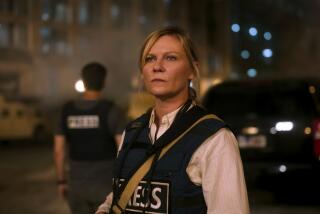Powerhouse performances can’t separate Denzel Washington’s ‘Fences’ from its stage roots
- Share via
If you close your eyes while watching “Fences,” you can listen as the extraordinary language of August Wilson’s Pulitzer Prize-winning play, some of the most thrilling speeches ever heard on an American stage, washes over you and lifts you up.
When you open your eyes, it’s as if the 2010 Broadway revival of that play, itself the winner of three Tonys, is unfolding right in front of you. Which is mostly, but not entirely, a good thing.
“Fences” is the first work by Wilson to become a feature film, and any opportunity to see one of the dramas in his 10-play American Century Cycle, which profoundly delve into a century’s worth of black experience in America, is something to be grateful for.
More than that, this “Fences,” working from a script Wilson completed before his death in 2005, reunites five cast members from that 2010 production.

Denzel Washington directs and stars in “Fences,” which features Viola Davis and Jovan Adepo and is based on the play of the same name by August Wilson.
These include topliners Denzel Washington and Viola Davis (both Tony winners) and extends to costars Stephen McKinley Henderson, Russell Hornsby and Mykelti Williamson, all gathered in the Maxson family backyard in a working class Pittsburgh neighborhood circa 1957.
But adapting Wilson to the screen turns out to be a tricky business. The language is so realistic, it fools you into thinking the work is ready-made for the screen. In fact the play, focused as it is on nothing but talk, is so intrinsically theatrical that the material lays traps for the unwary.
One of those, and one which “Fences” has in part fallen into, is letting reverence for the play and its language hamstring attempts at making the work fully come alive on screen.
Though “Fences” has been opened up a bit, including scenes inside the Maxson home, Washington’s direction, perhaps inevitably, feels straight ahead and stagebound. It gives off the unmistakable feeling that any attempt at cinematic excitement would be counterproductive if not sacrilegious.
But it is the achievement of this “Fences” that, despite this lack of visual involvement, the combination of top acting and the powerful rhythm of the language in the drama’s celebrated high spots absolutely holds us. Every moment on screen may not be enthralling, but the moments that are are such knockouts they make the enterprise essential viewing.
One way Washington does open up the play is to start “Fences” on the back of the garbage truck that sanitation worker Troy Maxson (Washington) and his pal Jim Bono (Wilson veteran Stephen McKinley Henderson at his best) spend their working lives on.
Troy, as is often the case with him, is expressing anger at the ways racial discrimination plays out, focusing in this case on the sanitation department’s caste system, asking, “How come you got all whites driving and the colored lifting?”
Once the conversation moves to the two men’s Friday night ritual of talk and drink in that backyard in the Hill (the area of Pittsburgh Wilson himself grew up in), the reason for Troy’s frustration becomes clear.
A premier baseball player who was a major force in the Negro League, Troy was too old to transition to the majors and that continues to rankle him. But when Jim, trying to calm him down, says, “You just come along too early,” Troy snaps back, “There ought not never have been no time called too early.”
If there is a constant in Troy Maxson’s life, it is his wife, Rose (Davis). Practical, grounded, a force for sanity and love, she understands her husband and his grandiosity better than he understands himself, and the faultless Davis captures her spirit exactly.
The other men in Troy’s life have more complex relationships with him, starting with Lyons (Russell Hornsby), his adult son from a previous marriage whom his father views with close to contempt for his habit of showing up on payday asking for a loan.
And then there is Gabriel (Mykelti Williamson), Troy’s brother, a World War II veteran with a traumatic head injury whose fears of hellhounds on his trail always disconcert his sibling.
Getting it worst of all is Cory (Jovan Adepo), Troy’s teenage son with Rose. A star high school football player, he is being recruited by a college in North Carolina, but his father will have none of it, insisting based on his own experience that “the white man ain’t gonna let him get nowhere with that football.”
Because he is larger than life both physically and psychologically, it is Troy’s actions in these crises and others that arise that define the drama of “Fences.”
Perhaps not surprisingly, Washington has a different take on the character than James Earl Jones, who originated the role in 1985. In addition to being fierce and physically imposing, Washington’s Troy has a nasty, almost malevolent streak that can be a problematic fit with the film’s eventual themes of acceptance and reconciliation.
No such qualms exist for Viola Davis, and when the camera is on her no one will be wanting to look elsewhere. Davis’ delivery of “Fences’ ” signature speech about her own hopes and dreams is flat-out extraordinary. One of August Wilson’s great strengths is his ability to combine personal drama with broad social themes, and this film eloquently underlines that gift.
===
Rating: PG-13 for thematic elements, language and some suggestive references
Running time: 2 hours, 13 minutes
Playing: ArcLight, Hollywood; Landmark, West Los Angeles
See the most-read stories in Entertainment this hour »
Movie Trailers
More to Read
Only good movies
Get the Indie Focus newsletter, Mark Olsen's weekly guide to the world of cinema.
You may occasionally receive promotional content from the Los Angeles Times.








